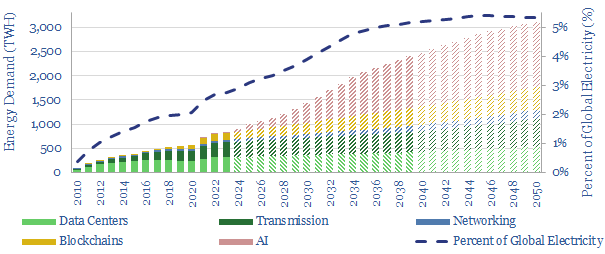Powering the internet consumed 800 TWH of electricity in 2022, as 5bn users generated 4.7 Zettabytes of traffic. Our best guess is that the energy consumption of the internet will double by 2030, including due to AI (e.g., ChatGPT), adding 1% upside to global energy demand and 2.5% to global electricity demand. This 14-page note aims to break down the numbers and their implications.
Global energy demand is a crucial debate. We expect 60% upside in useful global energy demand by 2050 (model here), while some commentators expect declines. And nearer term, we think the world could be gripped by energy shortages (note here, model here) (page 2).
Hence the energy consumption of the internet matters. In 2021, there were 4.9bn internet users globally, underpinning 3.4 Zettabytes of internet traffic. The energy footprint of the internet has most likely doubled since 2015 to 800TWH in 2022, as internet traffic has risen at a 30% CAGR (page 3).
Why does the internet consume energy? We have aimed to explain the end-to-end drivers of energy consumption, including data servers in data centers (page 4) and transmission and networking (page 5).
It is a minefield. Different studies disagree by five orders of magnitude over the energy intensity of internet processes. We offer some perspectives around why this is, and how we get comfortable making approximate estimates for the future (6-8).
Future energy demand of the internet could double by around 2030, and reach 5% of global electricity use by 2050. We spell out our models and the numbers that we have pencilled in, including for the rise of AI engines (e.g., ChatGPT) on page 10.
Uncertainty is high. When we consider how the internet has evolved in the past, and the way it might evolve in the future, it makes a mockery of the idea that future global energy demand is knowable a priori. It is a very brave policymaker that plans their future grid, the energy security of their nation, around the notion that future demand will decline (page 11).
Counterfactuals. The internet not only consumes energy. It also displaces energy. Especially oil product energy, which is electrified. Some favorite examples are quantified on page 12. And impacts on our oil models are discussed on page 13.
Company implications: another very hungry caterpillar? The energy upside for the internet is all electricity. Moreover it is high quality electricity. So once again our conclusion is that all roads lead to power electronics. A few pure-play listed equities that stood out in our work, and interesting private equity ideas, are noted on page 14.
